英汉翻译的方法——直译意译与归化异化
直译与意译,归化与异化
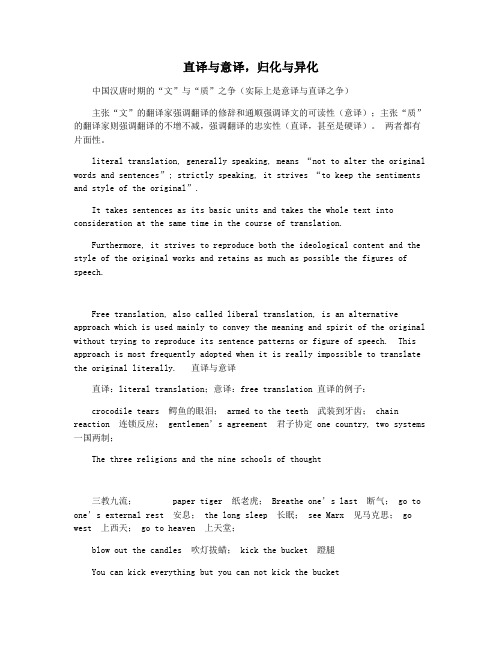
直译与意译,归化与异化中国汉唐时期的“文”与“质”之争(实际上是意译与直译之争)主张“文”的翻译家强调翻译的修辞和通顺强调译文的可读性(意译);主张“质”的翻译家则强调翻译的不增不减,强调翻译的忠实性(直译,甚至是硬译)。
两者都有片面性。
literal translation, generally speaking, means “not to alter the original words and sentences”; strictly speaking, it strives “to keep the sentiments and style of the original”.It takes sentences as its basic units and takes the whole text into consideration at the same time in the course of translation.Furthermore, it strives to reproduce both the ideological content and the style of the original works and retains as much as possible the figures of speech.Free translation, also called liberal translation, is an alternative approach which is used mainly to convey the meaning and spirit of the original without trying to reproduce its sentence patterns or figure of speech. This approach is most frequently adopted when it is really impossible to translate the original literally. 直译与意译直译:literal translation;意译:free translation 直译的例子:crocodile tears 鳄鱼的眼泪; armed to the teeth 武装到牙齿; chain reaction 连锁反应;gentlemen’s agreement 君子协定 one country, two systems 一国两制;The three religions and the nine schools of thought三教九流; paper tiger 纸老虎;Breathe one’s last 断气; go to one’s external rest 安息; the long sleep 长眠; see Marx 见马克思; go west 上西天; go to heaven 上天堂;blow out the candles 吹灯拔蜡; kick the bucket 蹬腿You can kick everything but you can not kick the bucket直译不等于死译(dead translation): 街道妇女应动员起来打扫卫生。
归化异化和直译意译的区别
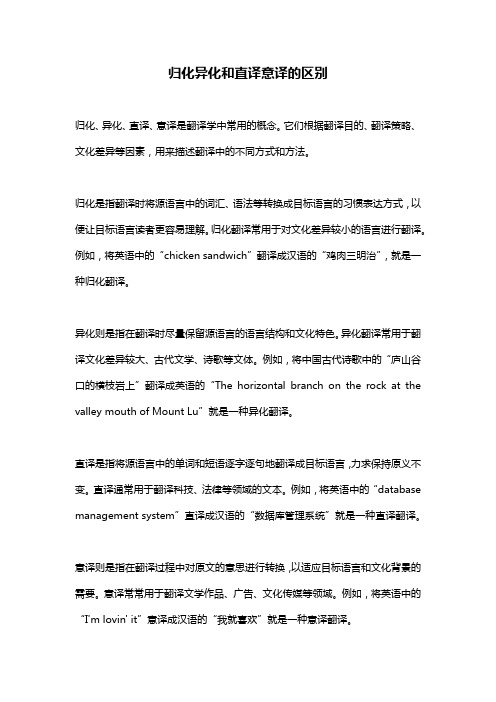
归化异化和直译意译的区别
归化、异化、直译、意译是翻译学中常用的概念。
它们根据翻译目的、翻译策略、文化差异等因素,用来描述翻译中的不同方式和方法。
归化是指翻译时将源语言中的词汇、语法等转换成目标语言的习惯表达方式,以便让目标语言读者更容易理解。
归化翻译常用于对文化差异较小的语言进行翻译。
例如,将英语中的“chicken sandwich”翻译成汉语的“鸡肉三明治”,就是一种归化翻译。
异化则是指在翻译时尽量保留源语言的语言结构和文化特色。
异化翻译常用于翻译文化差异较大、古代文学、诗歌等文体。
例如,将中国古代诗歌中的“庐山谷口的横枝岩上”翻译成英语的“The horizontal branch on the rock at the valley mouth of Mount Lu”就是一种异化翻译。
直译是指将源语言中的单词和短语逐字逐句地翻译成目标语言,力求保持原义不变。
直译通常用于翻译科技、法律等领域的文本。
例如,将英语中的“database management system”直译成汉语的“数据库管理系统”就是一种直译翻译。
意译则是指在翻译过程中对原文的意思进行转换,以适应目标语言和文化背景的需要。
意译常常用于翻译文学作品、广告、文化传媒等领域。
例如,将英语中的“I'm lovin' it”意译成汉语的“我就喜欢”就是一种意译翻译。
总之,归化、异化、直译、意译是翻译中的常见策略,每种策略都有其适用范围和特点。
在翻译时,应根据具体情况选择合适的翻译策略,以达到最佳的翻译效果。
浅谈英语翻译中的直译和意译资料讲解
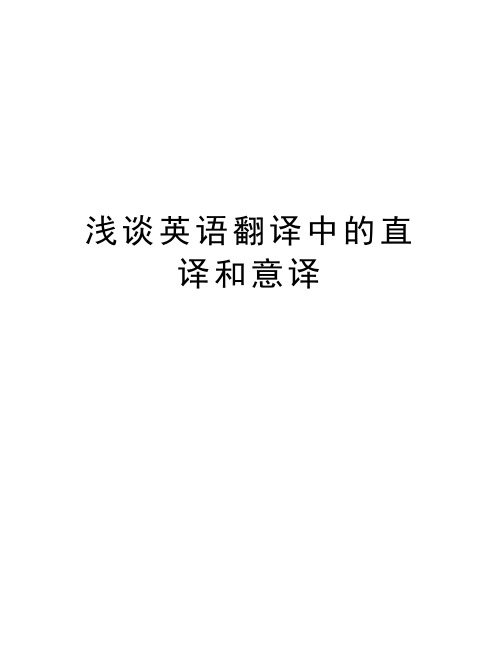
浅谈英语翻译中的直译和意译浅谈英语翻译中的直译和意译一)、Literal translation 直译(异化法 foreignization )Free translation 意译(归化法 domestication)英、汉两种语言在结构和语义表达方面存在着雷同和差异,翻译时有时用直译,有时用意译。
(1)、直译(Literal translation)指不仅忠实于原文内容,而且忠实于原文形式的翻译方法.直译把忠于原文内容放在第一位,把忠于原文形式放在第二位,要求在保持原文内容的前提下,力求使译文与原文在选词用字、句法结构、形象比喻及风格特征等方面尽可能趋同(无限接近)。
直译把通顺的译文形式放在第三位。
(1.1)直译的应用:(1.1.1)某些习语和短语的翻译,例如cold war 冷战 hot line 热线 spicy girl 辣妹black market 黑市 paper tiger纸老虎Blood is thicker than water 血浓于水The heart is seen in wine. 酒后吐真言(1.1.2)含义广为流传,读者较为熟悉的短语、习语等, 直译可以丰富译语语言。
例如:A. He walked at the head of the funeral procession, and every nowand then wiped his crocodile tears with a big handkerchief.他走在送葬队伍的前头,还不时用一条大手绢抹去那鳄鱼的眼泪。
B. The Senate Foreign Relations Committee today extended the olivebranch to the Clinton Government by pleading for cooperation indeveloping foreign policy.参议院外交委员会今天向克林顿政府伸出了橄榄枝,要求在发展外交政策上合作。
英汉互译八种技巧

注意事项
保持原文的语义和语法正确
在直译过程中,要确保译文准确地传达了原文的语义和语法,避 免出现歧义或误解。
尊重原文的文化特色
直译法要尊重原文的文化特色,尽可能保留原文的文化信息,避免 因文化差异而引起的误解。
符合目标语言的表达习惯
尽管直译法强调保持原文的形式,但译文仍需符合目标语言的表达 习惯,以使读者能够更好地理解和接受。
注意事项
准确理解原文
在运用直译与意译结合法时,首 先要准确理解原文的意思,避免
因理解错误而导致翻译错误。
灵活调整词序
在直译与意译结合的过程中,需 要根据汉语的表达习惯灵活调整 英文原句的词序,使译文更加自
然流畅。
保持原文风格
在翻译过程中,要尽量保持原文 的风格和语言特色,如比喻、修 辞等,以使译文更加贴近原文。
注意事项
加注应当符合目标语言的表达习惯和规范,避免出现 语法错误或表达不当的情况。
加注应当简洁明了,避免过多的解释和说明,以免影 响读者的阅读体验。
加注应当尽可能地保留原文的信息和意义,避免出现 信息丢失或误解的情况。
THANKS FOR WATCHING
感谢您的观看
文的含义。
符合目标语言习惯
意译法要求译文符合目标语言的表 达习惯和语法规则,避免出现生硬 或不符合规范的语言表达。
保持原意不变
意译法的核心是保持原文意思不变, 因此在翻译过程中要特别注意保持 原意的完整性和准确性,避免出现 信息的遗漏或误解。
04
音意结合法
定义
• 音意结合法是指在进行英汉互译 时,将英文的发音和汉语的意义 结合起来,以达到准确传达原文 意思的目的。
和文化背景。
适用范围
当源语言与目标语言存在较大 的文化差异和语言结构差异时, 归化法可以发挥很好的作用。
翻译技巧之翻译的归化和异化

翻译技巧之翻译的归化和异化
中文翻译的归化和异化是翻译过程中常用的两种策略。
归化是指将外
语的表达方式按照汉语的习惯和规范,尽可能地融入到中文中,使译文更
加符合汉语的语言特点。
而异化则是指保留原文的语言风格和结构,尽可
能地保持原文的独特性和个性。
在进行翻译时,如果选择归化策略,翻译者会更加注重译文的流畅性
和易读性,以使读者更容易理解和接受译文。
翻译者可能会使用一些常见
的汉语表达方式、习语和俗语,以使译文更加地贴近汉语的表达习惯。
这
种策略适用于一些地名、人名、时间、日期等容易被读者理解和接受的词汇。
而如果选择异化策略,翻译者则会更加注重保留原文的独特性和个性。
对于一些特定领域的术语、文化背景相关的词汇等,翻译者可能会选择直
接使用原文或者模仿原文的表达方式,以保持原文的风格和特色。
这种策
略适用于一些特定的文学作品、口头禅、谚语等需要传达原文情感和表达
方式的词汇。
在实际翻译工作中,翻译者会根据具体的情况和需求选择使用归化或
异化策略。
并且在翻译过程中平衡二者的使用,以达到准确传达原文信息
和表达原意的目的。
直译、意译与归化、异化之比较
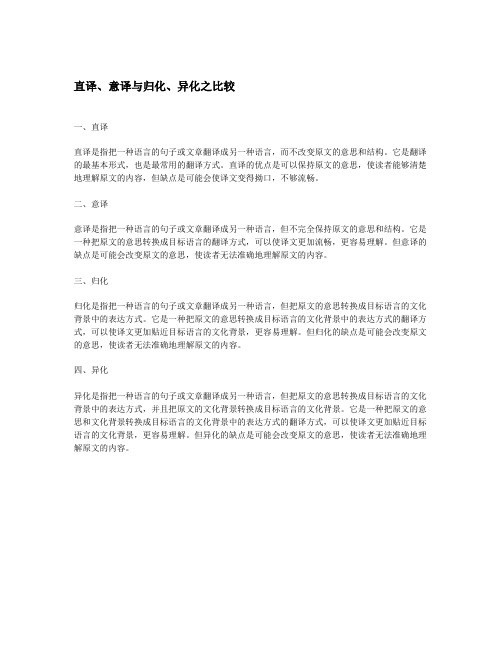
直译、意译与归化、异化之比较
一、直译
直译是指把一种语言的句子或文章翻译成另一种语言,而不改变原文的意思和结构。
它是翻译的最基本形式,也是最常用的翻译方式。
直译的优点是可以保持原文的意思,使读者能够清楚地理解原文的内容,但缺点是可能会使译文变得拗口,不够流畅。
二、意译
意译是指把一种语言的句子或文章翻译成另一种语言,但不完全保持原文的意思和结构。
它是一种把原文的意思转换成目标语言的翻译方式,可以使译文更加流畅,更容易理解。
但意译的缺点是可能会改变原文的意思,使读者无法准确地理解原文的内容。
三、归化
归化是指把一种语言的句子或文章翻译成另一种语言,但把原文的意思转换成目标语言的文化背景中的表达方式。
它是一种把原文的意思转换成目标语言的文化背景中的表达方式的翻译方式,可以使译文更加贴近目标语言的文化背景,更容易理解。
但归化的缺点是可能会改变原文的意思,使读者无法准确地理解原文的内容。
四、异化
异化是指把一种语言的句子或文章翻译成另一种语言,但把原文的意思转换成目标语言的文化背景中的表达方式,并且把原文的文化背景转换成目标语言的文化背景。
它是一种把原文的意思和文化背景转换成目标语言的文化背景中的表达方式的翻译方式,可以使译文更加贴近目标语言的文化背景,更容易理解。
但异化的缺点是可能会改变原文的意思,使读者无法准确地理解原文的内容。
归化和异化与意译和直译的比较

归化和异化与意译和直译的比较
直译意译与归化异化联系区别:1、含义不同。
直译在合乎译文语言的全民规范的情况下,译文刻真求真,通过保留原作形貌(表达方式)来保持作的内容与风格;2、意译使用译文语言中动用与原文相同或相似的表达形式,以代替原作中因两种语言不同而无法保留的内容与形式之间的相互关系。
从历史上来看,异化和归化可以视为直译和意译的概念延伸,但又不完全等同于直译和意译。
直译和意译所关注的核心问题是如何在语言层面处理形式和意义,而异化和归化则突破了语言因素的局限,将视野扩展到语言、文化和美学等因素。
按韦努蒂的说法,归化法是“把原作者带入译入语文化”,而异化法则是“接受外语文本的语言及文化差异,把读者带入外国情景”。
由此可见,直译和意译主要是局限于语言层面的价值取向,异化和归化则是立足于文化大语境下的价值取向,两者之间的差异是显而易见的,不能混为一谈。
施莱尔马赫两种翻译方法
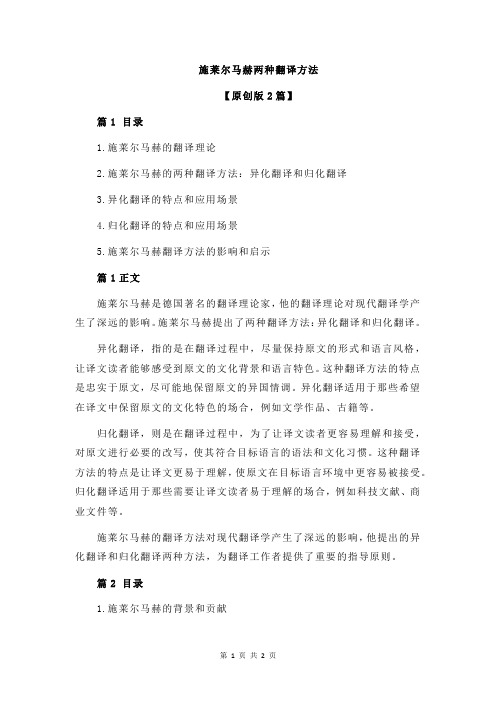
施莱尔马赫两种翻译方法【原创版2篇】篇1 目录1.施莱尔马赫的翻译理论2.施莱尔马赫的两种翻译方法:异化翻译和归化翻译3.异化翻译的特点和应用场景4.归化翻译的特点和应用场景5.施莱尔马赫翻译方法的影响和启示篇1正文施莱尔马赫是德国著名的翻译理论家,他的翻译理论对现代翻译学产生了深远的影响。
施莱尔马赫提出了两种翻译方法:异化翻译和归化翻译。
异化翻译,指的是在翻译过程中,尽量保持原文的形式和语言风格,让译文读者能够感受到原文的文化背景和语言特色。
这种翻译方法的特点是忠实于原文,尽可能地保留原文的异国情调。
异化翻译适用于那些希望在译文中保留原文的文化特色的场合,例如文学作品、古籍等。
归化翻译,则是在翻译过程中,为了让译文读者更容易理解和接受,对原文进行必要的改写,使其符合目标语言的语法和文化习惯。
这种翻译方法的特点是让译文更易于理解,使原文在目标语言环境中更容易被接受。
归化翻译适用于那些需要让译文读者易于理解的场合,例如科技文献、商业文件等。
施莱尔马赫的翻译方法对现代翻译学产生了深远的影响,他提出的异化翻译和归化翻译两种方法,为翻译工作者提供了重要的指导原则。
篇2 目录1.施莱尔马赫的背景和贡献2.施莱尔马赫的两种翻译方法:直译和意译3.直译的优缺点4.意译的优缺点5.如何选择合适的翻译方法篇2正文施莱尔马赫(Schleiermacher)是德国著名的语言学家和翻译理论家,他在翻译领域有着重要的贡献。
他提出了两种翻译方法:直译和意译。
直译,顾名思义,就是将原文的文字逐字逐句地翻译过来,不改变原文的语序和表达方式。
这种翻译方法的优点在于能够尽可能地保留原文的语境和文化背景,让读者更好地理解原文。
然而,直译也有其缺点,那就是可能会导致译文过于生硬,不符合目标语言的语法和表达习惯,使读者难以理解。
与直译相对的是意译,意译的核心思想是"传达原文的意义",而不是简单地复制原文的文字。
在意译中,译者可以根据目标语言的语法和表达习惯,对原文进行适当的改编,以便更好地传达原文的意义。
四种翻译方法,十种翻译技巧

四种翻译方法1.直译和意译所谓直译,就是在译文语言条件许可时,在译文中既保持原文的内容,又保持原文的形式——特别指保持原文的比喻、形象和民族、地方色彩等。
每一个民族语言都有它自己的词汇、句法结构和表达方法。
当原文的思想内容与译文的表达形式有矛盾不宜采用直译法处理时,就应采用意译法。
意译要求译文能正确表达原文的内容,但可以不拘泥与原文的形式。
(张培基)应当指出,在再能确切的表达原作思想内容和不违背译文语言规范的条件下,直译有其可取之处,一方面有助于保存原著的格调,另一方面可以进新鲜的表达方法。
Literal translation refers to an adequate representation of the original. When the original coincides or almost tallies with the Chinese language in the sequence of vocabulary, in grammatical structure and rhetorical device, literal translation must be used.Free translation is also called liberal translation, which does not adhere strictly to the form or word order of the original.(郭著章)直译法是指在不违背英语文化的前提下,在英译文中完全保留汉语词语的指称意义,求得内容和形式相符的方法。
意译是指译者在受到译语社会文化差异的局限时,不得不舍弃原文的字面意义,以求疑问与原文的内容相符和主要语言功能的相似。
(陈宏薇)简单地说,直译指在译文中采用原作的的表达方法,句子结构与原句相似,但也不排除在短语层次进行某些调整。
意译指在译文中舍弃原作的表达方法,另觅同意等效的表达方法,或指对原作的句子结构进行较大的变化或调整。
直译意译与归化异化
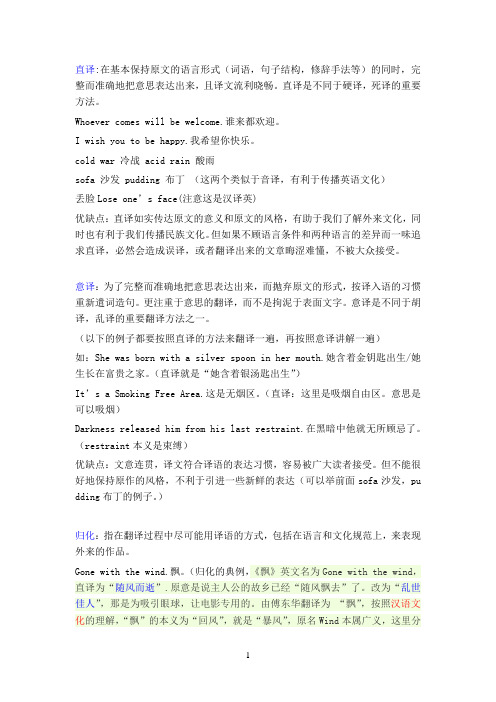
直译:在基本保持原文的语言形式(词语,句子结构,修辞手法等)的同时,完整而准确地把意思表达出来,且译文流利晓畅。
直译是不同于硬译,死译的重要方法。
Whoever comes will be welcome.谁来都欢迎。
I wish you to be happy.我希望你快乐。
cold war 冷战 acid rain 酸雨sofa 沙发 pudding 布丁(这两个类似于音译,有利于传播英语文化)丢脸Lose one’s face(注意这是汉译英)优缺点:直译如实传达原文的意义和原文的风格,有助于我们了解外来文化,同时也有利于我们传播民族文化。
但如果不顾语言条件和两种语言的差异而一味追求直译,必然会造成误译,或者翻译出来的文章晦涩难懂,不被大众接受。
意译:为了完整而准确地把意思表达出来,而抛弃原文的形式,按译入语的习惯重新遣词造句。
更注重于意思的翻译,而不是拘泥于表面文字。
意译是不同于胡译,乱译的重要翻译方法之一。
(以下的例子都要按照直译的方法来翻译一遍,再按照意译讲解一遍)如:She was born with a silver spoon in her mouth.她含着金钥匙出生/她生长在富贵之家。
(直译就是“她含着银汤匙出生”)It’s a Smoking Free Area.这是无烟区。
(直译:这里是吸烟自由区。
意思是可以吸烟)Darkness released him from his last restraint.在黑暗中他就无所顾忌了。
(restraint本义是束缚)优缺点:文意连贯,译文符合译语的表达习惯,容易被广大读者接受。
但不能很好地保持原作的风格,不利于引进一些新鲜的表达(可以举前面sofa沙发,pu dding布丁的例子。
)归化:指在翻译过程中尽可能用译语的方式,包括在语言和文化规范上,来表现外来的作品。
Gone with the wind.飘。
(归化的典例,《飘》英文名为Gone with the wind,直译为“随风而逝”.原意是说主人公的故乡已经“随风飘去”了。
浅谈英语翻译中的直译和意译
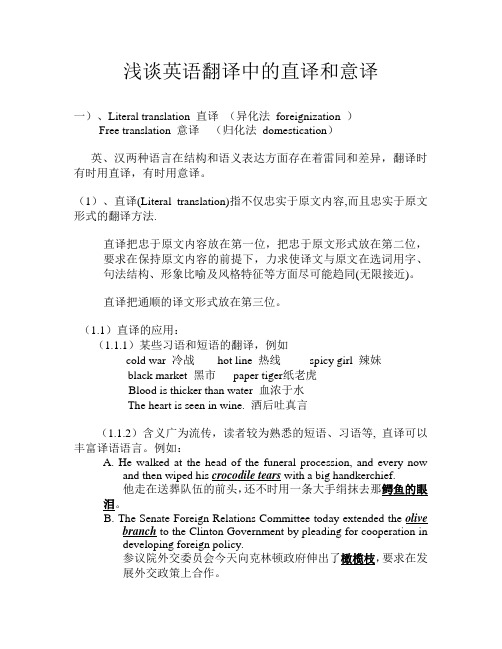
浅谈英语翻译中的直译和意译一)、Literal translation 直译(异化法foreignization )Free translation 意译(归化法domestication)英、汉两种语言在结构和语义表达方面存在着雷同和差异,翻译时有时用直译,有时用意译。
(1)、直译(Literal translation)指不仅忠实于原文内容,而且忠实于原文形式的翻译方法.直译把忠于原文内容放在第一位,把忠于原文形式放在第二位,要求在保持原文内容的前提下,力求使译文与原文在选词用字、句法结构、形象比喻及风格特征等方面尽可能趋同(无限接近)。
直译把通顺的译文形式放在第三位。
(1.1)直译的应用:(1.1.1)某些习语和短语的翻译,例如cold war 冷战hot line 热线spicy girl 辣妹black market 黑市paper tiger纸老虎Blood is thicker than water 血浓于水The heart is seen in wine. 酒后吐真言(1.1.2)含义广为流传,读者较为熟悉的短语、习语等, 直译可以丰富译语语言。
例如:A. He walked at the head of the funeral procession, and every nowand then wiped his crocodile tears with a big handkerchief.他走在送葬队伍的前头,还不时用一条大手绢抹去那鳄鱼的眼泪。
B. The Senate Foreign Relations Committee today extended the olivebranch to the Clinton Government by pleading for cooperation indeveloping foreign policy.参议院外交委员会今天向克林顿政府伸出了橄榄枝,要求在发展外交政策上合作。
直译意译归化异化翻译方法PPT课件

2024/5/9
21
LOGO
• 词汇的意译 有些词汇在一定的句子中具有一定的含义, 如果直译就会曲解原意, 因此必须采用意译 来处理。
Eg:You are the last person I want to see in the world. 此句话不能译成“你是世界上我想见到的最后一个人”, 而应译成“你是我最不想见的人”。 Every life has its roses and thorns. 人生有苦有甜。
归化法的缺点: losing original image bringing obstacle of cultural communication
2024/5/9
6
LOGO
异化
•是指偏离本土主流价值观,保留原文的语言和文化差 异;或指在一定程度上保留原文的异域性,故意打破 目标语言常规的翻译.同样这种通过异化处理而保留下 来的原作中的异国情调, 将在精神上给读者带来极大 的满足。所以,又被称为“译者的彰显/显身”(the translator’s visibility).
2024/5/9
11
LOGO
Relationship 归化与异化的关系
翻译要求我们忠实地再现原文作者的思想
和风格,而这些都是带有浓厚的异国情调
的,因此采用异化法是必然;同时译文又
要考虑到读者的理解及原文的流畅,因此 采用归化法也是必然。选取一个策略而完
对立统一
全排除另一种策略的做法是不可取的,也
是不现实的。它们各有优势,也各有缺陷,
2024/5/9
英汉翻译的方法——直译、意译与归化、异化
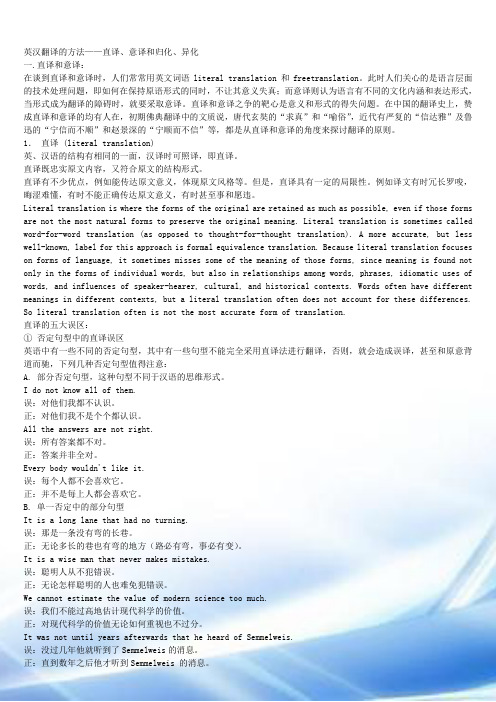
英汉翻译的方法——直译、意译和归化、异化一.直译和意译:在谈到直译和意译时,人们常常用英文词语literal translation 和freetranslation。
此时人们关心的是语言层面的技术处理问题,即如何在保持原语形式的同时,不让其意义失真;而意译则认为语言有不同的文化内涵和表达形式,当形式成为翻译的障碍时,就要采取意译。
直译和意译之争的靶心是意义和形式的得失问题。
在中国的翻译史上,赞成直译和意译的均有人在,初期佛典翻译中的文质说,唐代玄奘的“求真”和“喻俗”,近代有严复的“信达雅”及鲁迅的“宁信而不顺”和赵景深的“宁顺而不信”等,都是从直译和意译的角度来探讨翻译的原则。
1.直译 (literal translation)英、汉语的结构有相同的一面,汉译时可照译,即直译。
直译既忠实原文内容,又符合原文的结构形式。
直译有不少优点,例如能传达原文意义,体现原文风格等。
但是,直译具有一定的局限性。
例如译文有时冗长罗唆,晦涩难懂,有时不能正确传达原文意义,有时甚至事和愿违。
Literal translation is where the forms of the original are retained as much as possible, even if those forms are not the most natural forms to preserve the original meaning. Literal translation is sometimes called word-for-word translation (as opposed to thought-for-thought translation). A more accurate, but less well-known, label for this approach is formal equivalence translation. Because literal translation focuses on forms of language, it sometimes misses some of the meaning of those forms, since meaning is found not only in the forms of individual words, but also in relationships among words, phrases, idiomatic uses of words, and influences of speaker-hearer, cultural, and historical contexts. Words often have different meanings in different contexts, but a literal translation often does not account for these differences. So literal translation often is not the most accurate form of translation.直译的五大误区:①否定句型中的直译误区英语中有一些不同的否定句型,其中有一些句型不能完全采用直译法进行翻译,否则,就会造成误译,甚至和原意背道而驰,下列几种否定句型值得注意:A. 部分否定句型,这种句型不同于汉语的思维形式。
直译、意译翻译与归化、异化

直译、意译翻译与归化、异化1. 引言翻译是人类传递文化和知识的重要方式之一。
翻译既是一项技能,也是一门艺术。
随着世界的不断变化和发展,翻译在跨文化交流中扮演着越来越重要的角色。
在翻译过程中,翻译的种种选择和决策都会影响到最终的译文质量和传达效果。
本文将从直译、意译翻译以及归化、异化两个方面,探讨翻译中的选择与决策。
2. 直译翻译直译翻译是指在翻译过程中尽可能保持原文的结构和语言,将原文中的每一个单词和句子都翻译成对应的目标语言单词和句子。
直译翻译的优点在于可以保持原文的结构和风格,让读者更加真实地感受到作者的思路和表达方式。
但是,直译翻译的缺点也是显而易见的,由于两种语言在结构和语言习惯上存在差异,直译翻译可能会导致目标语言译文不自然、难以理解。
3. 意译翻译意译翻译是指在翻译过程中对原文的意思进行转换,而不是将原文的每一个单词和句子都翻译成目标语言。
意译翻译的优点在于可以更好地传达原文的意思,使目标语言译文更加自然、易懂。
但是,意译翻译也存在着风险,如果太过自由地进行意译,可能会失去原文的真实含义,甚至可能会引发读者的误解。
4. 归化与异化在翻译中,归化和异化是对翻译风格的两种基本取向。
归化是指让目标语言译文尽可能与本族语言的习惯和格式相符,以适应本族语言的接受习惯。
归化的优点在于可以较好地让读者理解和接受译文,但是它的缺点在于可能会失去原文的原汁原味,从而无法传达原文中的情感、风格和文化内涵。
异化则是指尽可能保留原文的风格、语言和文化特征,让目标语言读者了解和接受源文化。
异化的优点在于可以让目标语言读者真正贴近源文化,深入了解原文的风格和文化内涵。
但是异化可能会使目标语言读者感到困惑和陌生,缺乏亲切感,无法真正理解和接受译文。
5. 结论翻译是一门既复杂又有趣的艺术,在翻译过程中的选择和决策对最终的质量和传达效果有着至关重要的影响。
对于译者而言,掌握直译、意译的翻译方法,同时在归化与异化两种取向间把握分寸,是翻译成功的关键之一。
四种翻译方法,十种翻译技巧
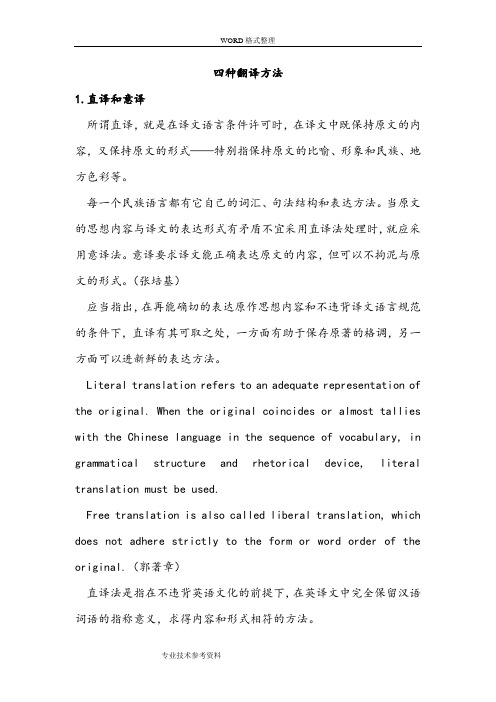
四种翻译方法1.直译和意译所谓直译,就是在译文语言条件许可时,在译文中既保持原文的内容,又保持原文的形式——特别指保持原文的比喻、形象和民族、地方色彩等。
每一个民族语言都有它自己的词汇、句法结构和表达方法。
当原文的思想内容与译文的表达形式有矛盾不宜采用直译法处理时,就应采用意译法。
意译要求译文能正确表达原文的内容,但可以不拘泥与原文的形式。
(张培基)应当指出,在再能确切的表达原作思想内容和不违背译文语言规范的条件下,直译有其可取之处,一方面有助于保存原著的格调,另一方面可以进新鲜的表达方法。
Literal translation refers to an adequate representation of the original. When the original coincides or almost tallies with the Chinese language in the sequence of vocabulary, in grammatical structure and rhetorical device, literal translation must be used.Free translation is also called liberal translation, which does not adhere strictly to the form or word order of the original.(郭著章)直译法是指在不违背英语文化的前提下,在英译文中完全保留汉语词语的指称意义,求得内容和形式相符的方法。
意译是指译者在受到译语社会文化差异的局限时,不得不舍弃原文的字面意义,以求疑问与原文的内容相符和主要语言功能的相似。
(陈宏薇)简单地说,直译指在译文中采用原作的的表达方法,句子结构与原句相似,但也不排除在短语层次进行某些调整。
意译指在译文中舍弃原作的表达方法,另觅同意等效的表达方法,或指对原作的句子结构进行较大的变化或调整。
英汉翻译的方法

归化的优缺点
01
缺点
02
可能存在过度归化的情况,导致译文失去原文的特色和风味。
03
在翻译一些具有特殊文化背景或难以在目标语言中找到对应表达方式 的文本时,归化法可能难以达到理想的翻译效果。
04
过度使用归化法可能会削弱译文的异国情调,使译文显得过于本土化。
归化的应用场景
文学翻译
在翻译文学作品时,归化法可以 帮助译者保留原文的文化元素, 同时使译文更加贴近目标语言的 表达习惯,增强译文的文学性和 审美价值。
广告文案翻译
广告文案通常需要具有高度的吸 引力和感染力,归化法可以帮助 译者将广告中的情感和信息准确 传达给目标受众,提高广告效果。
商业文件翻译
在商业文件中,归化法可以帮助 译者将原文的语义和表达方式转 化为符合目标语言文化和商业习 惯的表达方式,提高译文的准确 性和可读性。
Байду номын сангаас
05 异化法
异化的定义
一些外来词,如“TOEFL”翻译为“ 托福”。
一些具有特殊文化含义的词汇,如 “clone”翻译为“克隆”。
04 归化法
归化的定义
01
归化法是一种翻译方法,旨在 使译文更符合目标语言的表达 习惯和文化背景,使读者更容 易理解和接受。
02
它强调将源语言的语义和表达 方式转化为目标语言中对应的 表达方式,以使译文更加自然 流畅。
英汉翻译的方法
目录
• 直译法 • 意译法 • 音译法 • 归化法 • 异化法
01 直译法
直译的定义
直译是指将原文的语法结构和词汇直 接转换成目标语言,尽量保留原文的 形式和意义。
直译不改变原文的句式、修辞、比喻 等手法,力求在保持原文风格的基础 上传达原文的信息。
直译与意译归化与异化

Venuti proposes the strategy of resistant translation ( i.e. foreignization) against the tradition of smooth translation. He argues that foreignization “entails choosing a foreign text and developing a translation method along lines which are excluded by dominant cultural values in the target language. Foreignization advocated by Venuti and his followers is a non-fluent or estranging translation style designed to make visible the presence of the translator by highlighting the foreign identity of the ST and protecting it from the ideological dominance of the target culture.
EXAMPLES
Thin 直译:瘦 意译:清癯;清减;干瘪;行销骨立;皮包骨头; To kill two birds with one stone 直译:一石二鸟 意译:一箭双雕;一举两得;一并两用儿
To flog a dead horse 直译:鞭打死马 意译:白费力;徒劳;白搭;枉然;徒然;事后再做无益 的议论
When I do count the clock that tells the time, And see the brave day in hideous night; When I behold the violet past prime And sable curls all silver ‘do’er with white; 数完钟声,又是黄昏时候, 暮霭阴森,目送丽日西沉, 吾也见花飞花谢,紫兰消瘦, 见堆云乌丝,白发如银相侵。 计数罢自鸣钟,声声报时, 见百日晴光,沉入幽冥夜; 又看罢,紫罗兰过尽芳菲, 卷发貂黑,变作银aw a man, rough and illiterate, told his case was hopeless. 有一次,菲利浦遇到一位粗鲁、目不识丁的男病人。 他告诉菲利浦说他的病已无可救药。 一次,菲利浦给一位粗率、没文化的人看病,菲利浦 告诉他,他已没什么希望了。 Like a son of Bachus, he can drink up two bottles of whisky at a breath. 活像一位天生的刘伶,他能一口气喝光两瓶威士忌。 他简直像酒神巴克斯的儿子,能一口气喝完两瓶威士 忌。
英汉翻译的方法——直译、意译与归化、异化
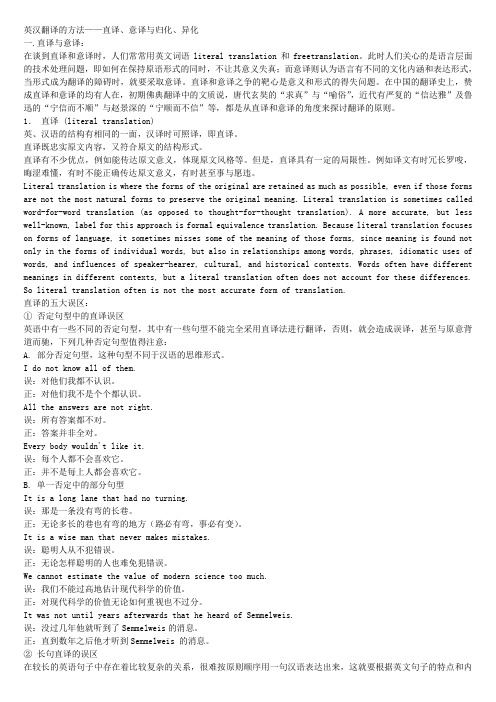
英汉翻译的方法——直译、意译与归化、异化一.直译与意译:在谈到直译和意译时,人们常常用英文词语literal translation 和freetranslation。
此时人们关心的是语言层面的技术处理问题,即如何在保持原语形式的同时,不让其意义失真;而意译则认为语言有不同的文化内涵和表达形式,当形式成为翻译的障碍时,就要采取意译。
直译和意译之争的靶心是意义和形式的得失问题。
在中国的翻译史上,赞成直译和意译的均有人在,初期佛典翻译中的文质说,唐代玄奘的“求真”与“喻俗”,近代有严复的“信达雅”及鲁迅的“宁信而不顺”与赵景深的“宁顺而不信”等,都是从直译和意译的角度来探讨翻译的原则。
1.直译 (literal translation)英、汉语的结构有相同的一面,汉译时可照译,即直译。
直译既忠实原文内容,又符合原文的结构形式。
直译有不少优点,例如能传达原文意义,体现原文风格等。
但是,直译具有一定的局限性。
例如译文有时冗长罗唆,晦涩难懂,有时不能正确传达原文意义,有时甚至事与愿违。
Literal translation is where the forms of the original are retained as much as possible, even if those forms are not the most natural forms to preserve the original meaning. Literal translation is sometimes called word-for-word translation (as opposed to thought-for-thought translation). A more accurate, but less well-known, label for this approach is formal equivalence translation. Because literal translation focuses on forms of language, it sometimes misses some of the meaning of those forms, since meaning is found not only in the forms of individual words, but also in relationships among words, phrases, idiomatic uses of words, and influences of speaker-hearer, cultural, and historical contexts. Words often have different meanings in different contexts, but a literal translation often does not account for these differences. So literal translation often is not the most accurate form of translation.直译的五大误区:①否定句型中的直译误区英语中有一些不同的否定句型,其中有一些句型不能完全采用直译法进行翻译,否则,就会造成误译,甚至与原意背道而驰,下列几种否定句型值得注意:A. 部分否定句型,这种句型不同于汉语的思维形式。
直译意译归化异化翻译方法PPT课件

翻译方法的分类与比较
直译与意译
直译是按照原文的句式和结构进行翻译,保留原文的表达方式和风格;意译则是 根据原文的含义和精神进行翻译,不拘泥于原文的形式。直译和意译各有优缺点 ,需要根据具体情况选择使用。
归化与异化
归化是将原文转化为目标语言的文化背景和表达方式,使译文更符合目标语言的 表达习惯;异化则是保留原文的文化背景和表达方式,使译文更贴近源语言的文 化氛围。归化和异化也各有优缺点,需要根据具体情况选择使用。
科技翻译
虽然科技翻译的语言较为严谨、客观,但为了使译文更加易于理解和接受,也需要采用归 化法。在科技翻译中,归化法可以帮助译者将源语言的科技语言转化为符合目标语言文化 背景和表达习惯的语言。
归化法的优缺点分析
符合目标语言的表达习惯
归化法的最大优点在于其符合目标语言的表达习惯和文化背景,使译文更加地道、易于理解。
提高读者的阅读体验
由于归化法注重译文的流畅性和自然度,以及充分考虑读者的阅读习惯和心理预期,因此可以提高读 者的阅读体验。
归化法的优缺点分析
• 有利于文化交流:归化法可以帮助读者更好地理 解源语言的文化内涵,促能失去源语言的文化特色
归化法的重点在于将源语言的文化背景转化为目标语言的文化背 景,但有时会导致源语言的文化特色在译文中失去。
异化法的优缺点分析
• 在某些特定场合下,如文学翻译、广告翻 译等,异化法能够更好地传达原文的情感 和风格。
异化法的优缺点分析
缺点
过度使用异化法可能导致译文生硬、晦涩,影响读者的 阅读体验。
在某些情况下,异化法可能导致译文读者难以理解原文 的含义和文化背景。
在某些专业领域或技术性文本中,异化法可能不适合, 因为需要准确传达信息而不是强调文化差异。
- 1、下载文档前请自行甄别文档内容的完整性,平台不提供额外的编辑、内容补充、找答案等附加服务。
- 2、"仅部分预览"的文档,不可在线预览部分如存在完整性等问题,可反馈申请退款(可完整预览的文档不适用该条件!)。
- 3、如文档侵犯您的权益,请联系客服反馈,我们会尽快为您处理(人工客服工作时间:9:00-18:30)。
英汉翻译的方法——直译、意译与归化、异化一.直译与意译:在谈到直译和意译时,人们常常用英文词语literal translation 和freetranslation。
此时人们关心的是语言层面的技术处理问题,即如何在保持原语形式的同时,不让其意义失真;而意译则认为语言有不同的文化内涵和表达形式,当形式成为翻译的障碍时,就要采取意译。
直译和意译之争的靶心是意义和形式的得失问题。
在中国的翻译史上,赞成直译和意译的均有人在,初期佛典翻译中的文质说,唐代玄奘的“求真”与“喻俗”,近代有严复的“信达雅”及鲁迅的“宁信而不顺”与赵景深的“宁顺而不信”等,都是从直译和意译的角度来探讨翻译的原则。
1.直译(literal translation)英、汉语的结构有相同的一面,汉译时可照译,即直译。
直译既忠实原文内容,又符合原文的结构形式。
直译有不少优点,例如能传达原文意义,体现原文风格等。
但是,直译具有一定的局限性。
例如译文有时冗长罗唆,晦涩难懂,有时不能正确传达原文意义,有时甚至事与愿违。
Literal translation is where the forms of the original are retained as much as possible, even if those forms are not the most natural forms to preserve the original meaning. Literal translation is sometimes called word-for-word translation (as opposed to thought-for-thought translation). A more accurate, but less well-known, label for thisapproach is formal equivalence translation. Because literal translation focuses on forms of language, it sometimes misses some of the meaning of those forms, since meaning is found not only in the forms of individual words, but also in relationships among words, phrases, idiomatic uses of words, and influences of speaker-hearer, cultural, and historical contexts. Words often have different meanings in different contexts, but a literal translation often does not account for these differences. So literal translation often is not the most accurate form of translation.直译的五大误区:①否定句型中的直译误区英语中有一些不同的否定句型,其中有一些句型不能完全采用直译法进行翻译,否则,就会造成误译,甚至与原意背道而驰,下列几种否定句型值得注意:A. 部分否定句型,这种句型不同于汉语的思维形式。
I do not know all of them.误:对他们我都不认识。
正:对他们我不是个个都认识。
All the answers are not right.误:所有答案都不对。
正:答案并非全对。
Every body wouldn't like it.误:每个人都不会喜欢它。
正:并不是每上人都会喜欢它。
B. 单一否定中的部分句型It is a long lane that had no turning.误:那是一条没有弯的长巷。
正:无论多长的巷也有弯的地方(路必有弯,事必有变)。
It is a wise man that never makes mistakes.误:聪明人从不犯错误。
正:无论怎样聪明的人也难免犯错误。
We cannot estimate the value of modern science too much.误:我们不能过高地估计现代科学的价值。
正:对现代科学的价值无论如何重视也不过分。
It was not until years afterwards that he heard of Semmelweis.误:没过几年他就听到了Semmelweis的消息。
正:直到数年之后他才听到Semmelweis 的消息。
②长句直译的误区在较长的英语句子中存在着比较复杂的关系,很难按原则顺序用一句汉语表达出来,这就要根据英文句子的特点和内在联系进行意译,不能直译的长句主要有三种处理方法。
A. 根据句子内在的逻辑关系和汉语的表达习惯进行翻译。
例如:There are advantages to underground life, too, and something to be said for imagingwhole cities, even mankind generally, moving downward, of having the outermost mile of the Earth's crust honeycombed with passage and structure, like a gigantic ant hill.这是一个倒装句,表示设想条件与结果关系,按这一关系来译比直译好,家似的建筑物,一座座城市都迁入地下,甚至全人类都迁入地下生活,这也会给人类带来很多好处。
The chances are that the dwellers of the new caves would see more greenery, under ecologically healthier conditions, than dwellers of surface cities do today.这个句子并不复杂,但不好译。
这个句子有三层关系,比较、条件和结果,按这种逻辑关系翻译就十分省事。
"同今天地面城市里的居民相比,新洞穴里的居民如果在比较健康的生态环境中生活,会有更多的机会见到青枝绿叶。
"B. 有些长句需要直译与意译结合,顺译与递译结合,需要综合处理。
But a broader and more generous, certainly more philosophical, view is held by those scientists who claim .that the evidence of a war instinct in men is incomplete and misleading, and that man does have within him the power of abolishing war.这个句子的主句部分可以意译,从句部分可直译。
有些科学家的观点更开阔,更富有普遍性和哲理性。
他们指出,有关人类战争本能的证据尚不完全,而且容易引起误解,事实上,人类自身具有消除战争的能力。
It was that population that gave to California a name for getting up astonishing enterprisesand rushing them through with a magnificent dash and daring and a recklessness of cost or consequences , which she bears unto this day .这个句子虽长,结构不复杂,如果进行直译,其译文将十分逊色,如果进行综合处理,译文将有声有色地传达原文的神韵。
"那里的人们富于大无畏的开创精神,建立庞大的企业,敢冒风险,势如破竹,一干到底,不顾及成本,因此为加利福尼亚赢得了声誉。
C. 由于有些句型不同于汉语的思维方式,常常需要进行倒译。
Textile finishes have in general become a "no-no" in today's market place ,thanks to many reasons ,says a representative of fiber producer.一位纤维厂家代表说,由于许多原因,纺织物整理剂在今天的市场上已经到无人的问津的地步。
How much easier, how much more satisfying it is for you who can see to grasp quickly the essential qualities of another person by watching the subtleties of expression, the quiver of a muscle, the flutter of a hand.比较起来,你们这些有视觉的人,通过观察表情的微妙变化,肌肉的颤动和手势来迅速把握别人的基本品质,则是何等容易,保等满意啊!③修辞句型中的误区同汉语一样,英语写作中大量运用修辞手段,其中有不少辞格类似于汉语机同辞格的表达方式,因此可以直译。
但有一些英语辞格很难用直译方式表达清楚,即便是同一辞格,由于处于不同场合,有的能直译,有的则不能直译。
下列几种情况有时不宜直译:A. 比喻:有的比喻可以直译,有的则不能,这往往取决于汉语的表达习惯例如:At the door to the restaurant, a stunning, porcelain-faced woman in traditional costume asked me to remove my shoes.如果把stunning ,porcelain-faced woman 译作"一位迷人的陶瓷般脸蛋的妇女"就显得粗俗滑稽,但是不是作者的本意。
这时意译就比较好。
"在通往餐厅的门口有一位妇女,涂脂抹粉、细皮嫩肉、身着和服、十分迷人,她叫我脱下鞋子。
"The girl is a dead shot.这位姑娘是神枪手。
(不能译作"死射手")After the failure of his last novel, his reputation stands on slippery grounds.他的上部小说失败之后,声誉一落千丈。
